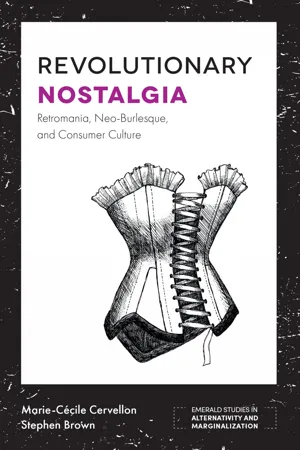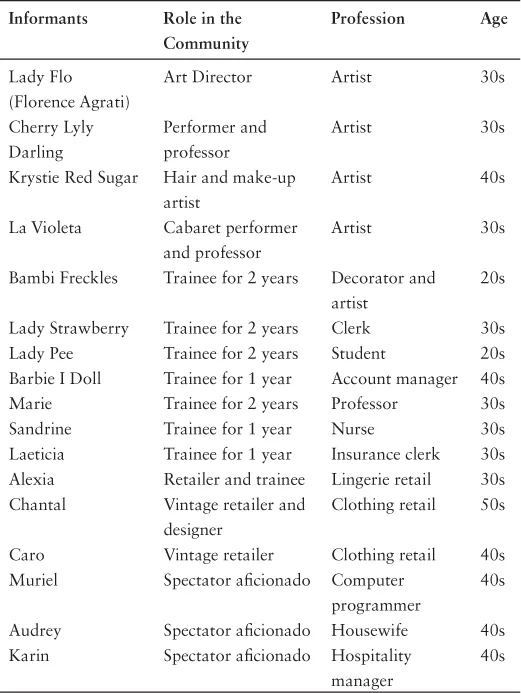
Revolutionary Nostalgia
Retromania, Neo-Burlesque, and Consumer Culture
- 185 pages
- English
- ePUB (mobile friendly)
- Available on iOS & Android
Revolutionary Nostalgia
Retromania, Neo-Burlesque, and Consumer Culture
About This Book
Nostalgia, they say, is not what it used to be. Once a witticism, this statement about the past has come to pass. Nostalgia really isn't what it used to be. Less than a generation ago, it was regarded as reactionary, as regressive, as reprehensible. Now, it is considered conducive to health, wealth, and human wellbeing. It is something that helps sell products and move merchandise, an underexploited critical resource with emancipatory potential.
Nowhere is this transformation better illustrated than in the neo-burlesque community, whose members not only embrace the art-form's golden age, and happily acquire heritage goods and vintage services, but turn their nostalgic leanings to emancipatory effect. They are retro revolutionaries, feather boa-wearing insurgents who find women's liberation in sequins and stilettos.
This book shines a spotlight on weapons-grade nostalgia, indicating how it is integral to insurrections throughout history, be they political, technological, or cultural. It reveals, through a combination of empirical ethnographic research and revolutionary literary criticism, the part nostalgia plays in a subversive consumer collective that uses fans, fishnets, and frivolity to fight for the right to party against patriarchy and find a fourth-wave form of female emancipation that foregoes old-school feminist fault-finding for good old-fashioned fun, fun, fun.
Frequently asked questions
Information
SOME DEFINITIONS OF NOSTALGIA
A wistful or excessively sentimental yearning for return to or of some past period or irrecoverable condition (Merriam-Webster). |
The name we commonly give for to a bittersweet longing for former times and spaces (Niemeyer, 2014, p. 1). |
Nostalgia is a recognition – pleasant, but not entirely welcome – that the past is home (Birkerts, 2000, p. 36). |
Recalling the fun without reliving the pain (Collins, 2011, p. 65). |
Today’s favoured mode of looking back (Lowenthal, 2015, p. 31). |
A positively toned evocation of a lived past (Davis, 1979, p. 18). |
An emotional state in which an individual yearns for an idealised or sanitised version of an earlier time period (Stern, 1992, p. 11). |
A sentimental or bittersweet yearning for an experience, product or service from the past (Baker & Kennedy, 1994, p. 169). |
Longing for what is lacking (Pickering & Keightley, 2006, p. 920). |
Bad history (Angé & Berliner, 2015, p. 4). |
An empty trope within an overly mediated society (de Groot, 2009, p. 249). |
The desire for desire (Stewart, 1999, p. 23). |
Optimism for the past (Smith, 2012, p. 11). |
Hankering for the idealised past … a mildly contemptuous descriptor for golden age myths of all kinds (Wernick, 1997, pp. 218–219). |
Yearning for a golden age in less complex, more harmonious times (Kammen, 1991, p. 294). |
A product of a shared historical consciousness of general displacement that is able to make parochial misfortunes and individual losses socially meaningful (Fritzsche, 2004, p. 64). |
A state of decline and languor caused by an obsessive regret for one’s native land, for the places where one lived for a long time (Kessous & Roux, 2008, p. 195). |
Nostalgia invokes a positively evaluated past world in response to a deficient present world (Tannock, 1995, p. 454). |
A powerful stimulant to feel optimistic about the future (Adams, 2014, p. 26). |
A situation where the problematic individual looks back with painful yearning and respect to the non-problematic individual of earlier times (Wright, 2009, p. 23). |
Nostalgia is neither illusion nor repetition; it is a return to something we have never had. Through nostalgia we know is not only what we hold most dear, but also the quality of experiencing that we deny ourselves habitually (Harper, 1966, pp. 26–27). |
LIST OF INFORMANTS

REFERENCES
Table of contents
- Cover
- Title
- Introduction
- Section I: Past & Present
- Section II: Focus & Findings
- Section III: Context & Concepts
- Conclusion
- Appendix 1: Some Definitions of Nostalgia
- Appendix 2: List of Informants
- References
- Index